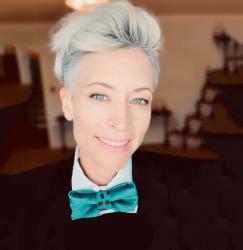
M. Wolff they/them
Associate Professor of Religion
- Phone: 309-794-7633
- Email: mwolff@augustana.edu
- Office: Old Main 003
Dr. Wolff teaches "Race, Ethnicity, & Religion," "Sexual Ethics," "Religion & Film," "Senior Capstone," "Christian Theology," and "Christian Ethics." South African-born, and U.S.-raised, Dr. Wolff was a first-generation college student.
Wolff was a 2016-2017 American Association of University Women dissertation fellow and completed a Ph.D. in Christian theology and ethics, certificate in College Teaching, and certificate in Feminist Studies at Duke University in 2017.
They were selected for the Wabash Center's 2021-22 Teaching and Learning Workshop for Early Career Religion Faculty Teaching Undergraduates.
Duke University Press published Body Problems: What Intersex Priest Sally Gross Teaches Us About Embodiment, Justice, and Belonging.
Scholarly publications
Guest editor with David Rubin and Amanda Swarr of "The Intersex Issue," special issue for Transgender Studies Quarterly.
Round table response to Joan Scott’s On the Judgment of History. Political Theology 23, No. 5, 498-505. DOI: 10.1080/1462317X.2022.2083835
"Companion Sex Robots: Racialized Household Economics" Journal of Feminist Studies in Religion, 2021, Vol. 37, No. 2, 43-64 DOI:10.2979/jfemistudreli.37.2.04.
Elisabeth Schüssler Fiorenza New Scholars Award *
“A Diptych Reading of Christ’s Transfiguration: Trans and Intersex Aesthetics Reveal Baptismal Identity,” Theology & Sexuality, 2019, Vol. 25, No. 1-2, pp. 1-12 DOI: 10.1080/13558358.2019.1636173.
“Karl Barth’s Christology and Jan Christian Smuts’ Human Rights Rhetoric,” Stellenbosch Theological Journal, December Vol. 5, No. 1.
“Madonna and Child of Soweto: Black Life Beyond Apartheid and Democracy,” Political Theology, 2018, Vol 19, Issue 7, pp. 572-592 DOI: 10.1080/1462317X.2018.1450468.
One of six articles over the past two decades on race and political theology selected to be made free and open access 2020
Teaching and mentoring
Students Cece Vu and Thao Chu turned their class project into a book that has been published "Womanist Dictionary: Womanism as a Second Language" (Excellence in Liberal Arts Award, presented at National Women's Studies Association annual conference 2021).
Dr. Wolff co-authored an article with undergraduate Aviana Zahara on the ethics of gender selection.
"Moonlight" (Mary Wollstonecraft first place)
Sports (Mary Wollstonecraft honorable mention short analytical essay award)
Environmentalism (Mary Wollstonecraft second place short analytical essay award)
Assault (Audre Lorde Writing Prize)
Public scholarship
“Trans Embodiment Beyond Entrapment, or, an Invitation to Cultivate Compassionate Curiosity,” Wabash Center for Teaching and Learning in Theology and Religion, invited contributor to series on “Embodied Teaching”
Co-authored with Stacy Williams, “Trauma Informed Pedagogy Begins with Educators,” Wabash Center for Teaching and Learning in Theology and Religion, invited contributor to series on “Embodied Teaching”
Editor for Linn Tonstad’s Queer Theology: Beyond Apologetics, Syndicate symposium
Editor for Sara Ahmed’s Living a Feminist Life, Syndicate symposium
“Ain’t She A Woman? Laverne, Caitlyn, & Christian Theology,” Cosmologics, Science, Religion, and Culture program at Harvard Divinity School, Vol. 2, No. 4, Winter
Service
Women’s, Gender, and Sexuality Studies working board member
Center for the Study of Judaism and Jewish Culture co-director
The Project of the Quad Cities, member of the board of directors
American Academy of Religion, Religion and Disability Studies Unit, steering committee member
American Academy of Religion, Queer and Trans Studies in Religion Unit , steering committee member
Former American Academy of Religion, Lesbian-Feminisms and Religion Group, co-chair
Works in progress
"Cruising Decolonial Utopias: AI Benefits and Threats, Real versus Imagined,” article contribution to Yale Divinity School conference special issue, Modern Theology
Queer Communities in the Illinois-Iowa Quad Cities, co-authored with geographer Christopher Strunk
Education
- B.A., Westmont College
- M.T.S., Duke Divinity School
- Ph.D., Duke University
